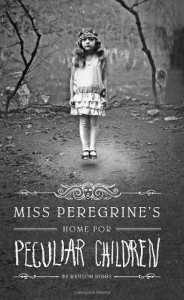Ironic Contradictions
A Peculiar Remembrance of Childhood...

Miss Peregrine's Home for Peculiar Children shot into popularity in a major way, apparently debuting at number 5 on the New York Times bestseller list. With its mixture of photography and storytelling many people were in love with the novel from the outset. However, others in the wake of the hype and love-affair with the book have proved to be more cynical. The photographs, some claim, are more of a gimmick to draw readers in and sell a book; the characters are the X-men rewritten, and to such readers the story itself only weakly surrounds these photographs. I, myself came to the novel unaware of this hype (I realised it was popular, however living in Australia means that I am less aware of how popular a novel is in the entire world) and my reaction therefore is to view the story as a wonderful composite.
I would first like to address the issue of the novel's plot and storytelling as merely a re-imagination of the X-Men. To myself, a long-time X-Men fan, this is a somewhat insulting notion to me. I say this because it suggests that the X-Men exist purely as 'weird powered mutants', like the peculiar children featured in the novel. However, to myself the X-Men have always been more than merely mutants, or the next step in some supposed evolutionary ladder. They exist as a metaphor (or simile, depending on your view) of humanity and its association with the other. To this end, Ransom Riggs' novel does reference the same kind of theme, but the expression of the idea is completely different, with a focus more on mysticism and magic than the pseudo-scientific application of mutation. Indeed, as I read the book, the most similar aspects to the X-Men are merely the powers and the fact that it is a school for 'mutant' children who possess a headmaster (or in this case headmistress). This is where the similarities ended, for the X-Men's Professor Xavier existed to guide his students, whereas Miss Peregrine exists more to protect and preserve her students. Which is not the same thing. It is the subtleties of both works which separates them, not the similarities.
As for the story itself, I must admit that it is hardly the strongest story every written. Yet, it is unique in its own right and further it is another of these young adult novels which are increasingly becoming finer examples of literature prose. No longer is it satisfactory to write a young adult novel which is mediocre in its writing and this book demonstrates such a fact. The story is unique in that it begins with revealing the details of an unfortunate accident which befalls our protagonist Jacob. It is this incident, which linked to Jacob's belief in his grandfather's stories of peculiar children and strange satanic monsters, leads to professional psychological examination and the crisis of the novel - a need for Jacob to travel to his grandfather's old orphanage and discover the truth.
Finally, as for the photographs, I believe they lend a crucial necessity to the story. Without the inclusion of the photographs, the story is nothing but a patchwork quilt. In other words, an interesting affair and yet hardly intriguing enough to rave about. Yet with the photographs the story takes on a Gothic and otherworldly air. The tone becomes one which is rather peculiar and feels both historic and whimsical. The beauty of the photographs is that they come from another time and capture such intricate moments (whether doctored or not) that one feels they had to have had some mysterious adventure connected to them. What Riggs has done is to provide the reader with the details of that adventure along with the photographs and some other images. And in doing so this becomes more than a novel, it becomes a sort of fantastical journal to sift through and enjoy. A kind of prosaic, Nox for children as it were.
If you happen to fancy whimsy and the peculiarity of a book which sits in between fantasy and science fiction then I urge an investigation of this novel. I found it to be charming and delightful in the best way. Some might consider such notions that the novel contains, best suited for a more naive or nostalgic age - for the photographs and some of the more absurd ideas of the novel feel dated and laughable at times. Yet all these aspects touched me personally, for I believe in a sense of wonder and childish dreaming and always will. I feel that is what this novel contains and I will eagerly look for the sequel.



 9
9
 10
10
